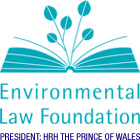I joined the Environmental Law Foundation (E.L.F) soon after it moved to City University’s building on Princeton Street and undertook a summer internship in the Advice and Referral Service. Although I had done mini-pupillage at environmental law sets most of my knowledge to that point had been gained in an academic environment, during my law degree and LLM. E.L.F. was advertised at City University when I was studying on the Bar Vocational Course (now BPTC). Interns come from a range of backgrounds but we all want to be part of an organisation which improves individuals’ and communities’ access to justice in an environmental context for many it is also an opportunity to put into practice skills they have learnt on professional courses such as the BVC and LPC.
In the Advice and Referral Service clients approach us with a range of problems. Where these problems are environmental problems we take on the client’s case and with them help to identify the legal issues through undertaking research on their behalf and getting the papers together in their case. We then get in touch with an adviser on our network which consists of solicitors, barristers and technical consultants. Each client can, as appropriate have one free consultation from each type of adviser and sometimes they will agree to do more work for the client on a pro bono or reduced fee basis.
Most interns volunteer two days a week. The day starts at 9:30am with a meeting to discuss what work needs to be done that day. Our phone line is open from 9:45am to 5:15pm. Typical tasks involve:
– handling new enquiries;
– calling clients to obtain further details and documents in ongoing cases;
– conducting research;
– writing instructions to counsel;
– finding suitable advisers from our network.
Working in the Advice and Referral Service I have dealt with a wide range of clients. The level at which individuals and communities are prepared to be involved taking action is admirable. They care deeply about environmental issues in their local area, and I have found it rewarding to be in a position to enable their access to legal advice. Unfortunately, having received their initial advice on a pro bono basis, some clients decide that they cannot proceed further with strong claims because of their financial position. Costs regretfully remain a barrier to justice in many of our cases.

The type of cases we deal with is varied and includes:
– planning applications with impacts on local wildlife and green spaces;
– land use and loss of open space;
– conservation and habitat protection;
– dust and air pollution;
– water pollution;
– radiation, chemical exposure and impacts on health;
– noise pollution;
– waste and fly-tipping.
I have also worked on a joint project between E.L.F. and Thamesbank, developing submissions to the public examination of the London Plan (the Mayor’s spatial development strategy) aiming to influence the plan to ensure the protection of the Thames and its surroundings. I have expanded my knowledge and developed my practical skills in working with clients, researching the law and indentifying issues in individual cases. I have found in rewarding to work with our network of advisers and am always impressed by their dedication to helping on individual cases.
My experience at E.L.F. has reinforced my view that environmental law has a huge impact both on the way we live now and the way communities will develop in the future.
Undertaking an internship at E.L.F. has been a great opportunity use what I learnt on the BVC, it has informed my career decisions and has helped me to gain that all important practical experience that employers are looking for.
Some of the benefits of undertaking an internship are:
– exposure to variety of clients engaging with them at various levels, so improving inter-personal skills;
– expanding knowledge of the law and processes;
– dealing with diverse and real life problems that demand broad thinking and innovative approaches ;
– the opportunity to relate to other practitioners in the field;
– dealing with experts and consultant specialists;
– acquiring capacity to deal with substantial workload;
– developing improvements in working methodologies within a friendly, albeit demanding, office.
I would highly recommend E.L.F. internships for anyone interested in environmental law and public law generally. For more information about some of our cases and information on how to apply see our website.

